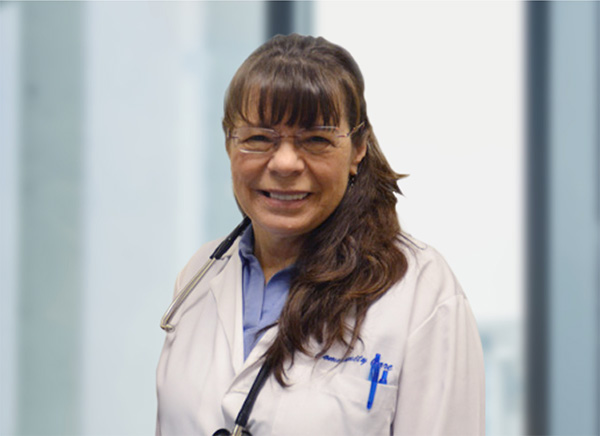Treating opioid addiction with evidence-based methods.
Treatment with medication, counseling, and cognitive therapy has been proven to be the most highly effective, long-term approach to successfully managing opioid addiction and enabling people to regain control of their lives.
Can opioid use disorder be cured?
Similar to other chronic disorders, such as diabetes or asthma, opioid addiction can be managed successfully through a combination of supervised treatment with approved medications, counseling, and behavior therapy. However, like other chronic disorders, there’s no one-size-fits-all approach and treatment isn’t a cure.
The road to recovery from opioid addiction can be a challenging one, and it’s rarely a straight path. The decision to seek treatment isn’t an easy one, and it requires time, trust, and, most importantly, support, for the brain to recover from the chemical changes and deeply rooted behaviors caused by repeated opioid use.
How treatment with medication works.
Treatment with medication has helped countless West Virginians recover from opioid use disorder. Approved medications like methadone, buprenorphine (Suboxone®), and naltrexone (Vivitrol®) are safe, effective treatments for alleviating the symptoms of opioid withdrawal or blocking the effects of opioids, while behavioral therapies help patients improve coping skills and reduce the likelihood of recurrence of symptoms.
Patients who receive these treatments are 50% less likely to die from overdose, have higher treatment retention rates, and better long-term outcomes—making them functional members of society again, capable of making healthy decisions for themselves and returning to their family and communities.
For many, medication with treatment can be completely tapered off, but for others, medication may be needed long-term to maintain a healthy chemical balance in the brain. Experts on addiction and recovery, like the Substance Abuse and Mental Health Services Administration (SAMHSA), recognize all pathways to recovery including abstinence attained with FDA-approved medications.
Doctors’ opinions.

Assistant Professor WVU, Department of Internal Medicine and Psychiatry; Board Certified in Internal Medicine, Psychiatry, Addiction Psychiatry and Addiction Medicine
For many in West Virginia, treatment with medication, accompanied by psychosocial support, has resulted in incredible, sustainable, constructive, life-changing results. I am honored to partner with my patients to witness and attest to these events. Treatment of opioid use disorders (OUD) has resulted in restored families; re-established careers; increased college enrollment; decreased criminal activity and establishment of physical, emotional and spiritual health.
Despite clear and convincing evidence that treatment with medication is an efficacious treatment for OUD, the Substance Abuse and Mental Health Services Administration’s estimates demonstrate that less than 12% of people with this disease receive care. Stigma plays a large role in this. Stigma in our community, unfortunately, leads to delays in seeking treatment; decreased referrals to treatment; and reduces the likelihood of receiving adequate care.
Stigma also causes great social and economic burdens. Stigma has contributed to the scarcity of adequate treatment centers that provide short- and long-term care; lack of insurance coverage and reimbursement; lack of trained providers; macro- and micro-aggression towards those with OUD, their families and even their treatment providers.
I believe some ways we as a community can help increase the ratio of recovery from OUD are by: understanding and accepting that those with OUD are not the blame for their illness and neither are they in control of it; using non-stigmatizing language; recognizing that OUD is a lifelong illness that needs the chronic disease model of management; and encouraging, supporting and lobbying for the use of treatment with medication for this devastating disease.
Here in West Virginia, treatment with medication is available. Treatment with medication works.



Retired; Chairperson, Pocahontas County Prevention Coalition
I, unfortunately, came to know all about stigma when my two daughters developed opiate use disorder (OUD) and both died of an overdose.
Stigma keeps problems and awareness in the shadows. People don’t want to talk about substance use disorder (SUD) thinking they are the only ones who have been affected by this affliction. Without knowledge and discussion, stigma delays diagnosis and treatment.
Stigma can prevent people from welcoming harm reduction programs, treatment facilities, and sober living houses into their communities. Stigma can even affect the method of treatment of the disease and undermine the data supporting treatment with medication, which has proven to be the standard of care.
According to the Substance Abuse Mental Health Services Administration, medication with treatment reduces heroin use and overdose deaths. It increases social functioning and retention in treatment while decreasing crime, and infectious diseases. And yet many in the public, rehabilitation facilities, and medical professionals believe treatment with medication is just exchanging one addiction for another. Those with knowledge about treatment with medication must speak up and educate everyone about its benefits.
The stigma surrounding treatment with medication stems from the belief that addiction is a moral failing, and it can be overcome with will power. Can emphysema caused by smoking be overcome by will power? No, it’s the result of an addiction to cigarettes. We must treat the lung disease as well as the underlying nicotine addiction that caused it.
People have to set aside their pre-conceived notions, prejudices, and ignorance of treatment with medication and follow the science and data. Stigma solves nothing and only prolongs this deadly epidemic.
Find a treatment center
If you or someone you know is struggling with opioid use disorder, don’t put off treatment any longer. You’re not alone and recovery is possible. Visit dhhr.wv.gov/office-of-drug-control-policy/help/ to locate the treatment center closest to you. 1‑844‑HELP4WV offers call, text, or chat options for immediate help.
Need a ride?
Need transportation to treatment and recovery care services at no cost? Call 1‑888‑696‑6195 or visit wvtransit.com for more information.
Need more resources?
Medication and Counseling Treatment
StigmaFreeWV
Movable Project
Help for Parents. Hope for Kids.
Office of Drug Control Policy
Are you a medical professional looking to offer
opioid use disorder treatment with medication?
Apply For a Practitioner Waiver and Visit Office Based Medication Assisted Treatment Resources